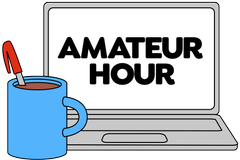Amateur Hour is an advice column for people who are new to the professional world and are figuring out how work even… works.
Advertisement
I want to quit. My job is likely to continue like this and I'm really unhappy. I don't feel like this is the job for me. I don't want to feel terrible and incompetent all the time. Many of the major parts of this role are not what I ultimately want to do. It's having a terrible impact on my mental health. But I know it would be stupid to quit. Prior to this, my roles in this industry have been short-term. This is partly because of contracts, because I moved countries, and because I left my previous role after a short time to take this job. Then there's also the title bump, and the fact I have a well-paying, full-time job during a global pandemic (these are notoriously hard to find in my industry, period). I know if I quit any time soon, I'm shooting myself in the foot. But I don't know what to do. How long do I have to keep struggling before it's okay to leave?If you were just kind of dissatisfied, I’d tell you to stay. I’d tell you that your first job in your field can often be a bit removed from what you ultimately want to do, because the early stages of a career often look different from the later stages. I’d tell you that adjusting to new things you haven’t done before is part of the deal with most new jobs and not a reason to panic—the adjustment period is hard but it usually gets better. And I’d tell you that sometimes it makes sense to stick it out at a less-than-ideal job because it’s a stepping stone to something better.
Advertisement
But you don’t sound like you’re just kind of dissatisfied. You sound really unhappy and your mental health is being affected. It’s possible that you’re just in the wrong job. It happens, and it’s OK to course-correct when it does. You don’t have to—and shouldn’t—sacrifice your mental well-being for your career. That said, I wonder if you’ve talked to your manager about your concerns. If you haven’t, I’d try that first (and soon!) before you make any decisions. Tell her about the challenges you’re running into, ask for more support, and see what she says. Yes, she’s busy—but even busy managers can often find time to give people more support when it’s needed. They need to know it’s needed though, so you have to talk to her before concluding it’s not possible.If you talk to her and nothing improves… well, that’s still useful information. At that point you’ll know you’ve taken reasonable steps to try to make the situation work, and if it’s still not working for you, you can more confidently conclude the job just isn’t the right match. Maybe it would have been if we weren’t in a pandemic and you weren’t working remotely. Maybe not. Either way, it’s OK to conclude that the job, as is, is wrong for you. (It’s also OK to conclude that without talking to your boss if things feel really dire! You’re not obligated to try to make it work.)None of this is intended to dismiss your concerns about quitting a well-paying job in a competitive field during a pandemic. Those are valid concerns, and they deserve real consideration. Plus, when your previous roles have all been short-term, ideally you want a longer-term stay on your resume so that other employers don’t wonder if you’ll leave them quickly too. But we’re talking about your mental health here. This isn’t “I’m bored at my job” or “the job isn’t what I thought it would be.” This is “my job is actively making me miserable and harming my mental health.” Building a career is important, but protecting your health matters more.And I promise you that plenty of successful people had stops and starts and setbacks early in their careers. (Hell, throughout their careers, for that matter!) This probably isn’t your last opportunity to work in your field. I don’t want to be a Pollyanna about it, because the job market is bad and there’s no guarantee you’ll find the perfect job. Walking away from a hard-to-get role is a risk and there’s a possibility, however remote, that leaving could set you on a different path than the one you’d envisioned. But when you’re weighing your health versus your career, pick your health.Of course, how quickly you can do that will depend on your finances and how much of a safety net you have. If you have savings and/or a family that’s willing to provide a soft place to land while you look for the next job, your options will look different than if you need to stay until you find something else. But you can leave a job that’s making you miserable.Get more good advice from Alison Green at Ask a Manager or in her book. Do you have a pressing work-related question of your own? Submit it using this form.
